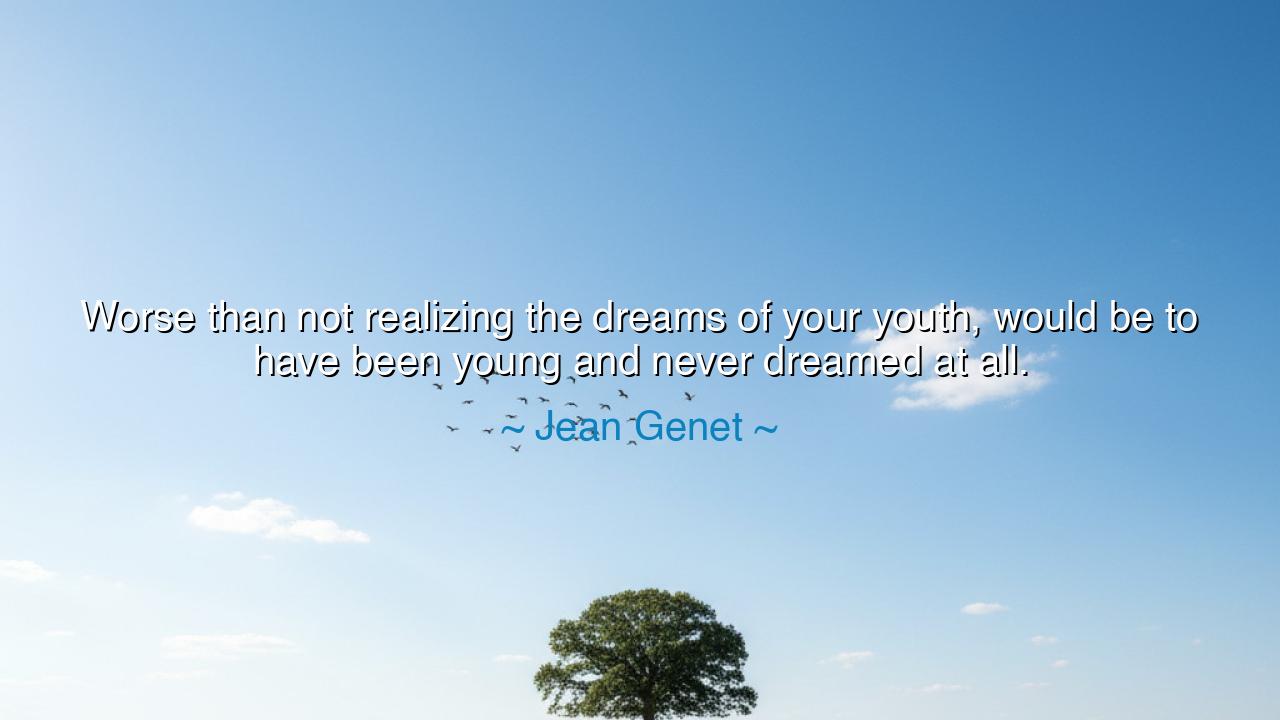
Worse than not realizing the dreams of your youth, would be to
Worse than not realizing the dreams of your youth, would be to have been young and never dreamed at all.






“Worse than not realizing the dreams of your youth, would be to have been young and never dreamed at all.” Thus spoke Jean Genet, the French writer and rebel soul, whose life was itself a poem carved out of hardship, exile, and defiance. In these words, Genet captures one of the deepest truths of human existence: that to dream — to imagine, to hope, to reach — is the most sacred act of youth, and that to live without dreaming is a death that begins long before the body’s end. His voice rises like an ancient oracle reminding us that failure is not the tragedy of life — stagnation is.
Born into poverty, abandoned at birth, and cast into prisons, Genet knew suffering intimately. Yet, through all his trials, he clung to the fierce fire of imagination. He dreamed of beauty in the face of ugliness, of freedom in confinement, of redemption through art. It was through his dreams that he transformed the darkness of his life into something radiant, creating works that dared to speak of human pain and passion with unflinching honesty. When he said it is worse never to have dreamed, he spoke not from comfort but from survival. For he knew that even unrealized dreams give purpose, direction, and dignity — that the act of dreaming itself is a rebellion against despair.
To dream is to touch the infinite, to see beyond the smallness of one’s circumstances. The youth who dreams, though poor, is rich in possibility; the one who does not, though surrounded by luxury, is impoverished in spirit. Genet reminds us that dreams are not meant merely to be achieved — they are meant to awaken the soul. They are the wind that stirs the still waters of our being. And even when dreams fail, they leave behind traces of greatness, for every dream, realized or not, expands the boundaries of what we believe ourselves capable of.
History, too, bears witness to this truth. Consider the story of Vincent van Gogh, who dreamed of beauty so pure it consumed him. Though he died poor, unrecognized, and tormented, his dreams of color and light survived him, reshaping the very soul of art. His brushstrokes were the language of longing, the testament of a man who refused to let the darkness silence his vision. Van Gogh did not realize the dreams of his youth — but worse would have been to never dream at all, to live without that luminous madness that made his heart and canvas burn with divine fire.
Genet’s words also carry a warning to the comfortable and the complacent. In a world that rewards conformity and punishes imagination, many abandon their dreams before they have even begun to chase them. They trade the wild, untamed beauty of youth for safety, reputation, and routine. Yet what are these compared to the fire of a dream? The one who never dreams may live long, but he lives shallowly; his days are filled with doing, yet devoid of becoming. To dream is to dare the gods — to say, “I will create something that did not exist before,” whether that creation is a poem, a movement, or a new way of being.
And even when the years pass, when youth fades and the body slows, the spirit that once dreamed does not truly grow old. Those who have dreamed retain a spark, a gleam in the eye, a restlessness of purpose. For dreams are not limited to age; they are the language of the eternal within us. The dreamless, however, grow cold and brittle, for they have denied the sacred conversation between the soul and the infinite. Genet’s wisdom calls us to remember that the dream, not its realization, is what keeps life holy — it is the bridge between who we are and who we might yet become.
Therefore, O listener, take this teaching as your compass: do not fear to dream, even if your dreams seem beyond reach. The act of dreaming is the act of living deeply. Dream boldly in your youth, and let those dreams carry you through the tempests of life. If your dreams are shattered, gather their fragments and build anew, for even in ruins, a dream retains its power to inspire. Never let the practical bury the possible, nor the safe suffocate the sublime.
For in the end, as Jean Genet knew, the greatest sorrow is not failure, but the absence of desire. To have been young and never dreamed is to have walked through the garden of life with closed eyes — to have lived without tasting its wonder. So, open your eyes, raise your heart, and dare to dream. For even if you never reach the horizon, you will have walked toward the sunrise — and that, in itself, is a kind of immortality.






AAdministratorAdministrator
Welcome, honored guests. Please leave a comment, we will respond soon